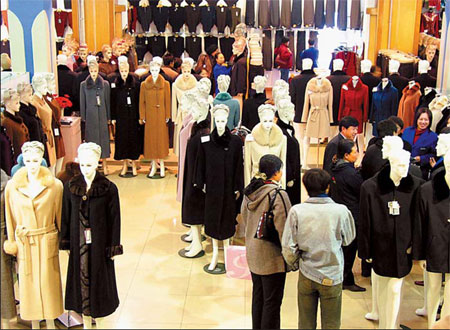Han Yongguang, the managing director of Beijing Mansion Guiyou Co, which caters to higher-income consumers, should know.
"A growing number of middle-class customers are becoming more picky in their daily shopping," Han said.
"They seem to spend more time and take more care in choosing what they buy now than ever before," he added.
Impulsive buying has also given way to cool-headed bargain hunting.
"It is obvious that many customers are now buying only what they need and not what they want, and they tend to buy mainly items that are on sale," Han said.
 Shoppers at a clothing store in Yakeshi, Inner Mongolian autonomous region. With the cost of food and other necessities rising since early last year, middle-class consumers are becoming more price-conscious.
Shoppers at a clothing store in Yakeshi, Inner Mongolian autonomous region. With the cost of food and other necessities rising since early last year, middle-class consumers are becoming more price-conscious.
Although retail sales show little sign of slowing down, retailers say customers are generally becoming more choosy about their purchases and trying to avoid items after a price hike.
Latest statistics compiled by National Bureau of Statistics showed that in the first six months of the year, the total retail sales in urban areas stood at 3.48 trillion yuan, up 22.1 percent from a year earlier.
Unsurprisingly, sales at department stores like Guiyou have not been as brisk as they used to be. Some have actually reported a slight decline in turnover in the past several months. The uncertain outlook has prompted many department stores and hypermarkets to trim their inventories of high-end goods in sync with customers' changing buying habits.
According to Han, sales in his department store showed a mild decline starting from early this year.
"The declining sales and a growing number of prudent shoppers make suppliers hesitant to place heavy inventories in our department store, but arrange supply according to the market situation," he added.
"I did not use to think much when I wanted to buy something I like," said Ge Baojia, a 28-year-old IT engineer in Beijing.
"I just went ahead and did it. But now I am spending more time on deciding which item to buy, hoping to strike a balance between quality and price."
In Dalian, Zhu Wei, a 27-year-old designer working in a Japanese advertising company, put it more specifically. In the past, she said she bought yogurt, her favorite food, whenever she felt the urge. But since the price of the dairy product has surged by more than 50 percent in the past months, she buys them only in bulk whenever there is a promotion at her neighborhood store.
"I feel I owe it to myself to purchase yogurt in a planned way to combat rising inflation," Zhu said.
Since then, she has extended her yogurt-buying strategy to the procurement of other basic necessities.
"I found that buying shampoo in large bottles is more economical than buying them in small packages, although it's going to take me forever to finish one big bottle of the stuff," she said.